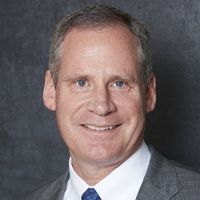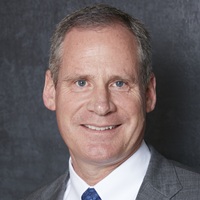Ditch the Golf Shoes: Your Retirement Needs a Side Gig
A side gig in retirement can help combat boredom, loneliness and the threat of inflation eroding your savings. And the earlier you start planning, the better.


Profit and prosper with the best of Kiplinger's advice on investing, taxes, retirement, personal finance and much more. Delivered daily. Enter your email in the box and click Sign Me Up.
You are now subscribed
Your newsletter sign-up was successful
Want to add more newsletters?

Delivered daily
Kiplinger Today
Profit and prosper with the best of Kiplinger's advice on investing, taxes, retirement, personal finance and much more delivered daily. Smart money moves start here.

Sent five days a week
Kiplinger A Step Ahead
Get practical help to make better financial decisions in your everyday life, from spending to savings on top deals.

Delivered daily
Kiplinger Closing Bell
Get today's biggest financial and investing headlines delivered to your inbox every day the U.S. stock market is open.

Sent twice a week
Kiplinger Adviser Intel
Financial pros across the country share best practices and fresh tactics to preserve and grow your wealth.

Delivered weekly
Kiplinger Tax Tips
Trim your federal and state tax bills with practical tax-planning and tax-cutting strategies.

Sent twice a week
Kiplinger Retirement Tips
Your twice-a-week guide to planning and enjoying a financially secure and richly rewarding retirement

Sent bimonthly.
Kiplinger Adviser Angle
Insights for advisers, wealth managers and other financial professionals.

Sent twice a week
Kiplinger Investing Weekly
Your twice-a-week roundup of promising stocks, funds, companies and industries you should consider, ones you should avoid, and why.

Sent weekly for six weeks
Kiplinger Invest for Retirement
Your step-by-step six-part series on how to invest for retirement, from devising a successful strategy to exactly which investments to choose.
Retirement looks meaningfully different today than it did when I started in the industry nearly 30 years ago.
For one thing, we are living longer thanks to advances in modern medicine. In addition, folks are remaining active for longer, whether they're traveling, playing pickleball or working later in life.
On a recent trip to Florida, two of the Uber drivers I had were retired. When I asked them why they chose to drive a rideshare, they told me they were looking for two things: A little extra money and something to do.
From just $107.88 $24.99 for Kiplinger Personal Finance
Become a smarter, better informed investor. Subscribe from just $107.88 $24.99, plus get up to 4 Special Issues

Sign up for Kiplinger’s Free Newsletters
Profit and prosper with the best of expert advice on investing, taxes, retirement, personal finance and more - straight to your e-mail.
Profit and prosper with the best of expert advice - straight to your e-mail.
"I can't play golf seven days a week, after all, and driving folks around gives me some nice social interaction," one of them said.
The Kiplinger Building Wealth program handpicks financial advisers and business owners from around the world to share retirement, estate planning and tax strategies to preserve and grow your wealth. These experts, who never pay for inclusion on the site, include professional wealth managers, fiduciary financial planners, CPAs and lawyers. Most of them have certifications including CFP®, ChFC®, IAR, AIF®, CDFA® and more, and their stellar records can be checked through the SEC or FINRA.
I have worked with hundreds of clients as they enter retirement, and one critical learning that I have noted is the importance of retiring to something and not just away from something.
People who retire from their jobs are more successful when they also have a plan for the next chapter of life.
The nine-to-five grind that has preoccupied their Monday through Friday schedule for four or more decades has now ended, and that large void must be replaced with something, whether that's travel, grandchildren, community service, volunteer work, additional education, hobbies or another activity.
During my career, I have witnessed both successful retirement transitions and unsuccessful ones, and in my experience, retirements without a purpose or goal are most often found to be less meaningful over time.
The rise of the side gig
Partially because of the recent rise in inflation, an increasing number of my clients have taken on part-time jobs or "side gigs" to help supplement their income. The "gig economy" helps make this possible with flexible hours, remote work, diverse opportunities and more.
In a recently conducted survey by our firm, D.A. Davidson, we learned that 41% of retired Americans currently do not feel that they can support their ideal retirement.
Whether they are worried about inflation, feel they started saving too late, or have realized their savings needs to last longer than they initially anticipated, only 8% of retirees presently have a side gig that can supplement their retirement savings.
Of those retired Americans without a side gig, two-thirds wish they had one.
It seems only logical to find pursuits that fulfill the dual purposes of generating some income and adding purpose and meaning to life.
And it would be far better to begin exploring these possibilities while you're still working, rather than waiting until you're retired.
Reflecting on what a meaningful side gig could look like before retirement can help crystallize the "retire to" goal mentioned previously.
- Could a hobby be turned into an online business?
- Could a handyman gig bring satisfaction, purpose and income?
- Perhaps a charitable or community involvement that was volunteer work during one's working years could actually transition to paid part-time work while still benefiting the organization or cause that has meaning.
Side gigs in practice
In my own practice, I've seen a wide variety of side gigs. One client who worked for decades as a psychologist and professor at a university began writing mystery novels in his retirement.
This began as a goal to both entertain and embed therapy techniques and learnings to a wider audience. He is now nine books into his series with more on the way.
And the royalties are an added bonus to the fulfillment he gets from doing what he loves. He is retired, but "busier than ever and enjoying it."
Another client turned her passionate knitting hobby into an Etsy business once she retired. She had always knitted sweaters and scarves for gifts, so why not do the same custom work for the public? The hobby she loves now generates a small income.
Looking for expert tips to grow and preserve your wealth? Sign up for Building Wealth, our free, twice-weekly newsletter.
Another client, who focused on communications and public relations in her professional career, also volunteered at a retirement home where her mother lived for many years.
Once her retirement approached, she was able to turn this volunteer job into a part-time paid communications position to earn a bit of side income while staying involved with the work she already loved.
Looking ahead
When I first began working in financial services, the most frequent retirement discussions I had with clients were around how they were going to spend their time after work.
The accepted norm was that you worked at a company for years and then entered the "golden years" of non-work. Leisure, travel, playing with grandchildren, golfing, you know the rest.
Now, however, with the emergence of the gig economy and more active retirements, I predict that side gigs will continue to become far more commonplace.
Our survey indicated that of Americans over age 50 who have not yet retired, 63% have considered a side gig once they do.
And if you think that working during retirement would be drudgery — of those surveyed with a side gig, 93% said they enjoyed theirs.
As modern medicine continues to extend our lifespans, retirement for many may begin to look more like a transition from full-time work to a part-time side gig.
To ensure that your golden years are a success, spend time thinking about something purposeful and meaningful in your community to retire to. You may be glad you did.
The D.A. Davidson Financial Advisor sending this publication may have specifically noted authorship of this publication. All expressions of opinion reflect the judgement of the author(s) as of the date of publication. The opinions and comments expressed may not accurately reflect those of D.A. Davidson & Co., member FINRA/SIPC.
Related Content
- 32 Ways to Make Money in 2025
- Thinking About a Side Hustle? Three Things to Consider
- Fun Things to Do in Retirement With Added Tax Benefits
- Want to Live Longer? Here's What Works
- The Rule of 1,000 Hours in Retirement
Profit and prosper with the best of Kiplinger's advice on investing, taxes, retirement, personal finance and much more. Delivered daily. Enter your email in the box and click Sign Me Up.

Andrew Crowell, Vice Chairman of Wealth Management, joined D.A. Davidson in August 2013 with the merger of D.A. Davidson & Co. and Crowell, Weedon & Co. Prior to his financial services career, which began in 1995 with Crowell, Weedon, he was associated with Russ Reid Company, an advertising agency serving local and worldwide nonprofit organizations. In addition to serving as a board member for D.A. Davidson Companies, Andrew serves on the board of the YMCA of Metropolitan Los Angeles and the Five Acres Children’s Aid Society.
-
 Nasdaq Leads a Rocky Risk-On Rally: Stock Market Today
Nasdaq Leads a Rocky Risk-On Rally: Stock Market TodayAnother worrying bout of late-session weakness couldn't take down the main equity indexes on Wednesday.
-
 Quiz: Do You Know How to Avoid the "Medigap Trap?"
Quiz: Do You Know How to Avoid the "Medigap Trap?"Quiz Test your basic knowledge of the "Medigap Trap" in our quick quiz.
-
 5 Top Tax-Efficient Mutual Funds for Smarter Investing
5 Top Tax-Efficient Mutual Funds for Smarter InvestingMutual funds are many things, but "tax-friendly" usually isn't one of them. These are the exceptions.
-
 Nasdaq Leads a Rocky Risk-On Rally: Stock Market Today
Nasdaq Leads a Rocky Risk-On Rally: Stock Market TodayAnother worrying bout of late-session weakness couldn't take down the main equity indexes on Wednesday.
-
 Quiz: Do You Know How to Avoid the 'Medigap Trap?'
Quiz: Do You Know How to Avoid the 'Medigap Trap?'Quiz Test your basic knowledge of the "Medigap Trap" in our quick quiz.
-
 5 Top Tax-Efficient Mutual Funds for Smarter Investing
5 Top Tax-Efficient Mutual Funds for Smarter InvestingMutual funds are many things, but "tax-friendly" usually isn't one of them. These are the exceptions.
-
 Why Invest In Mutual Funds When ETFs Exist?
Why Invest In Mutual Funds When ETFs Exist?Exchange-traded funds are cheaper, more tax-efficient and more flexible. But don't put mutual funds out to pasture quite yet.
-
 We Retired at 62 With $6.1 Million. My Wife Wants to Make Large Donations, but I Want to Travel and Buy a Lake House.
We Retired at 62 With $6.1 Million. My Wife Wants to Make Large Donations, but I Want to Travel and Buy a Lake House.We are 62 and finally retired after decades of hard work. I see the lakehouse as an investment in our happiness.
-
 Social Security Break-Even Math Is Helpful, But Don't Let It Dictate When You'll File
Social Security Break-Even Math Is Helpful, But Don't Let It Dictate When You'll FileYour Social Security break-even age tells you how long you'd need to live for delaying to pay off, but shouldn't be the sole basis for deciding when to claim.
-
 I'm an Opportunity Zone Pro: This Is How to Deliver Roth-Like Tax-Free Growth (Without Contribution Limits)
I'm an Opportunity Zone Pro: This Is How to Deliver Roth-Like Tax-Free Growth (Without Contribution Limits)Investors who combine Roth IRAs, the gold standard of tax-free savings, with qualified opportunity funds could enjoy decades of tax-free growth.
-
 One of the Most Powerful Wealth-Building Moves a Woman Can Make: A Midcareer Pivot
One of the Most Powerful Wealth-Building Moves a Woman Can Make: A Midcareer PivotIf it feels like you can't sustain what you're doing for the next 20 years, it's time for an honest look at what's draining you and what energizes you.